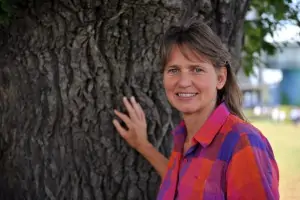Encountering nature is the great strength of golf
Get out into the countryside – outdoor sports have experienced a boom in the past few years. But as striking as the trend was during the Corona crisis, outdoor activities have been increasingly popular for several years – even if they involve such special forms as “forest bathing”. Golf is a sport that originated in nature and – apart from driving ranges in city centers or short courses in city centers – is played in the countryside.
Why is nature attracting us more and more – and what does that mean for the sport of golf? Questions we asked the German sports psychologist Eva Pfaff from Königstein near Frankfurt. The former world-class tennis player has now discovered golf for herself.
What influence does entering nature have on the golfer?
Pfaff: Humans generally have five senses with which they perceive the environment. They taste, smell, feel, see and hear. With these senses they experience and process what affects them. Entering nature is definitely reassuring overall, because people encounter far fewer stimuli than in their normal environment – unless this would be extremely rural. On the golf course you come across sounds of nature, plants that grow. All processes run at a comparatively low speed, a natural speed.
Can golf therefore also be used therapeutically, for example against extreme stress or burnout?
Pfaff: Yes, you can. You always have to take into account the personality you are dealing with. How does a person perceive something, what does it take away and how does it feel? Take, for example, someone who lives and works largely in the city. When he comes into a natural environment like the golf course, it seems like nothing to him.
How can the success of the therapy be determined here?
Pfaff: People are automatically grounded in the countryside. If a golfer notices that exercise in nature is good for him, then he does it more often because he feels the positive effect in his subconscious.
On the one hand, we are talking about the tranquility of nature – on the other hand, golf as a sport is always associated with factors such as performance or the stress of success. How does that fit together?
Pfaff: I think you have to distinguish between a golfer who is aiming for a specific result or who is generally playing at a high level and a golfer who is just looking for fun and relaxation. If you want to perform, you first concentrate on it. For him the tree is in the way, just an obstacle. In this case, nature is a setting within which one retrieves athletic performance and pursues a goal. Then nature gets less attention.
In that case, the golf course would be a sports field like a tennis court….
Pfaff: Even with a very sporting understanding, golf is completely different. In a match on the tennis court, you experience more of the feeling of a battle. Another person is constantly doing something to me. The atmosphere is that of fights, you run, you slide and you sweat. There is generally much more calm on the golf course. The atmosphere is completely different.
Is it perhaps even too quiet for children and young people today?
Pfaff: Yes. It’s exaggeratedly boring. Because the green golf course seems extremely calm to a child coming out of their normal modern environment. This non-existence of (electronic) stimuli is very unusual at first. The key here is to draw a child’s attention. You can also bring nature closer to children, then it becomes interesting.
The ex-world-class tennis player Eva Pfaff is now active as a sports psychologist and works a lot in coaching with top athletes
How can you train a better perception of the natural environment – also in adults?
Pfaff: Some people have completely lost the feeling for nature. I point such clients directly to certain things on the golf course: animal noises, the movement of the ground. I then notice again and again that golfers, who otherwise perhaps only think about the score, increasingly develop an awareness of what is happening in nature while they are waiting.
Doesn’t nature distract from the concentration on the sport, or does it even negatively influence the result?
Pfaff: It can definitely have positive consequences if you direct your attention in a targeted manner. For example, registering the natural environment can be a relaxing element during sport. Even top athletes are looking for such methods again and again, with each athlete individually tailoring their own suitable program. There are pros who talk to their caddy between shots or when waiting, others are looking for a different type of mental relaxation – perhaps in the nature of their environment.
To what extent did the Covid-crisis increase the willingness to deal with nature?
Pfaff: Especially in this phase of the lockdown, more and more people were moving about in the countryside every day because modern life was no longer happening to the same extent as before. For activities that take place in nature, including golf, this was a huge opportunity.
To what extent is this factor “experiencing nature” already present as a health factor in the communication of golf?
Pfaff: From my point of view, not enough. I don’t think it’s conveyed enough that this is golf’s great strength. It’s actually an incredible power that sport has. You just have to convey them.








